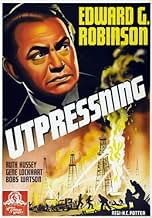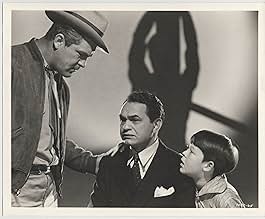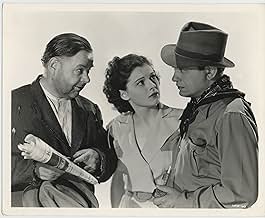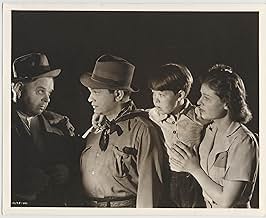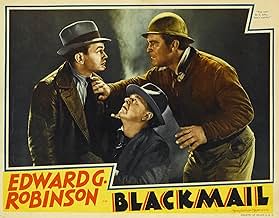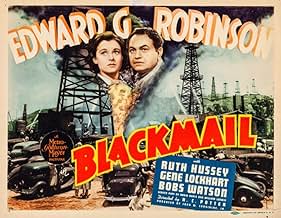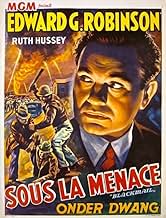VALUTAZIONE IMDb
6,7/10
880
LA TUA VALUTAZIONE
Aggiungi una trama nella tua linguaJohn Ingram, successful oil field firefighter, is really a chain gang escapee. Someone out of his past finds him.John Ingram, successful oil field firefighter, is really a chain gang escapee. Someone out of his past finds him.John Ingram, successful oil field firefighter, is really a chain gang escapee. Someone out of his past finds him.
- Regia
- Sceneggiatura
- Star
Guinn 'Big Boy' Williams
- Moose McCarthy
- (as Guinn Williams)
Lew Harvey
- Workman
- (scene tagliate)
Mitchell Lewis
- Workman
- (scene tagliate)
Ted Oliver
- Workman
- (scene tagliate)
Lee Phelps
- Guard
- (scene tagliate)
Trevor Bardette
- Southern Deputy
- (non citato nei titoli originali)
Willie Best
- Bunny - the Janitor
- (non citato nei titoli originali)
Stanley Blystone
- Oil Worker
- (non citato nei titoli originali)
Wade Boteler
- Police Sergeant
- (non citato nei titoli originali)
Ed Brady
- Prisoner Worrying About Dick Tracy
- (non citato nei titoli originali)
Recensioni in evidenza
Back in the mid-1930s, Warner Brothers came out with a shockingly brutal and absorbing drama about the evils of chain gangs. Paul Muni's performance and the script for "I Was a Fugitive From a Chain Gang" were superb and the film has held up great over the years. Because of this, films like "Blackmail" seem incredibly bland and pale in comparison.
When this MGM film begins, John Ingram (Edward G. Robinson) is a successful and well respected man whose job it is to put out oil fires. Unfortunately, he's also a fugitive from some Southern chain gang-- an innocent man who couldn't prove this but managed to escape. Since then, assuming a new identity, he's gone on to make a productive life and a nice family. However, when a scumbag (Gene Lockhart) comes to town, Ingram is in trouble. While he's just asking for a job, this guy is a crook and is the guy who is actually responsible for the crime Ingram was arrested for years ago.
So far, while the plot is hard to believe, it is worth seeing. What happens next, however, sure strains credibility way past the breaking point. The scum-bag EASILY convinces Ingram that he is willing to own up to his crime but only if he gets a huge payoff. In other words, he'll admit to the crime but escape--leaving evidence that will clear Ingram's name. Not at all surprisingly (since he IS a crook), he tricks Ingram and it's Ingram who is sent to prison. Duh.
For the rest of the film, Robinson spends his time in prison. However, the chain gang is run by a bunch of brutes (though they are FAR less brutal than the guys in the earlier film) and eventually he realizes he must escape in order to ever see his family again.
So why does this film earn a 5? Well, it is entertaining but it breaks absolutely no new ground and pretty much neuters the old plot. The chain gang, while unpleasant, doesn't seem all that bad and instead of this form of imprisonment being indicted, the film actually is all about capturing the real baddie and sending him to prison where he rightfully belongs. Amazingly poor considering the material.
When this MGM film begins, John Ingram (Edward G. Robinson) is a successful and well respected man whose job it is to put out oil fires. Unfortunately, he's also a fugitive from some Southern chain gang-- an innocent man who couldn't prove this but managed to escape. Since then, assuming a new identity, he's gone on to make a productive life and a nice family. However, when a scumbag (Gene Lockhart) comes to town, Ingram is in trouble. While he's just asking for a job, this guy is a crook and is the guy who is actually responsible for the crime Ingram was arrested for years ago.
So far, while the plot is hard to believe, it is worth seeing. What happens next, however, sure strains credibility way past the breaking point. The scum-bag EASILY convinces Ingram that he is willing to own up to his crime but only if he gets a huge payoff. In other words, he'll admit to the crime but escape--leaving evidence that will clear Ingram's name. Not at all surprisingly (since he IS a crook), he tricks Ingram and it's Ingram who is sent to prison. Duh.
For the rest of the film, Robinson spends his time in prison. However, the chain gang is run by a bunch of brutes (though they are FAR less brutal than the guys in the earlier film) and eventually he realizes he must escape in order to ever see his family again.
So why does this film earn a 5? Well, it is entertaining but it breaks absolutely no new ground and pretty much neuters the old plot. The chain gang, while unpleasant, doesn't seem all that bad and instead of this form of imprisonment being indicted, the film actually is all about capturing the real baddie and sending him to prison where he rightfully belongs. Amazingly poor considering the material.
This film starts with a bang - literally. It also ends with a bang. You see Edward G is an oil-fire fighter in Oklahoma - and he's doing really well. Great job (if a little dangerous), great house, great wife, great kid. Trouble is he is actually a fugitive from a chain gang - and his past is about to catch up with him. A shame it does really because the scenes of Eddy walking fearlessly into fire-balls are unforgettable. A story about the lives of oil-fire-fighters would have been a lot more interesting than the rather dull blackmail leading to a return to chain gang stuff. The chain gang scenes never live up to those of the masterpiece "I am a Fugitive from a Chain Gang" - but I wouldn't be surprised if Hitler got a few ideas on his slave labor camps from this film. Were the chain gangs of the thirties really this brutal? If so there were a few "war criminals" in the Southern USA.
Anyway the film drifts back to oil fires at the end - and the climax is really spectacular. It is enhanced by Ed's magnificent performance, and an unforgettable snivelling evil performance from Gene Lockhart. Both rise above the ordinary material. Also impressive is Guinn Williams, but the very talented Ruth Hussey is given little to do but look worried, and Bobs Watson is VILE as the cry-baby son. All in all good MGM entertainment, with some great sequences.
Anyway the film drifts back to oil fires at the end - and the climax is really spectacular. It is enhanced by Ed's magnificent performance, and an unforgettable snivelling evil performance from Gene Lockhart. Both rise above the ordinary material. Also impressive is Guinn Williams, but the very talented Ruth Hussey is given little to do but look worried, and Bobs Watson is VILE as the cry-baby son. All in all good MGM entertainment, with some great sequences.
Here's to You Mr. Robinson. Even when Slightly Miscast and Upstaged by the Villain Edward G. managed to put Verve and Gusto in any Role. Here he goes from Family Man to a Rage Filled, Revenge Seeking Psycho Hell Bent on Saving His Family and Fortune from a Slimy and Totally Repugnant former "Friend".
There are some Minor Cringe-Inducements mostly at the Beginning with some Comedy Relief and Smarmy Family Stuff, but Once the Blackmailer Shows Up Things Kick into Overdrive and there are some Very Effective Chain Gang Scenes and a Suspenseful Escape.
The Oil Fires are Realistic and this is one of the Few Times that MGM tried to be Gritty and Deliver a Message. They were Aping Warner Brothers and did a Pretty Good Imitation.
There are some Minor Cringe-Inducements mostly at the Beginning with some Comedy Relief and Smarmy Family Stuff, but Once the Blackmailer Shows Up Things Kick into Overdrive and there are some Very Effective Chain Gang Scenes and a Suspenseful Escape.
The Oil Fires are Realistic and this is one of the Few Times that MGM tried to be Gritty and Deliver a Message. They were Aping Warner Brothers and did a Pretty Good Imitation.
Edward G. Robinson here is a victim of "Blackmail," a 1939 film starring Robinson, Ruth Hussey, and Gene Lockhart.
Ingram (Robinson, his wife (Hussey) and his son (Bobs Watson, known as the "Crybaby of Hollywood") live in Oklahoma, where Ingram fights oil fires He's considered one of the best. But he has a secret - nine years earlier, under another name, he was on a chain gang for something he didn't do, and he escaped.
All is well until William Ramey (Lockhart), someone from his past, shows up and blackmails him, using the promise of getting Ingram cleared, since it was he who committed the crime. However, he double crosses Ingram, who ends up back on a chain gang.
Ingram decides that this time, he will do his full sentence. Things happen to change his mind.
Gritty drama with Robinson suffering as only he can. Like Bogart, he could be mean as dirt or a sympathetic character. Here he's tough, caring, and sympathetic. Ruth Hussey gives a lovely performance as his wife, and I admit that Bobs Watson was so pathetic when he cried that I cried. He became a Methodist minister but kept acting as well.
Though the acting is effective, this is a routine drama. The actors keep you involved.
Ingram (Robinson, his wife (Hussey) and his son (Bobs Watson, known as the "Crybaby of Hollywood") live in Oklahoma, where Ingram fights oil fires He's considered one of the best. But he has a secret - nine years earlier, under another name, he was on a chain gang for something he didn't do, and he escaped.
All is well until William Ramey (Lockhart), someone from his past, shows up and blackmails him, using the promise of getting Ingram cleared, since it was he who committed the crime. However, he double crosses Ingram, who ends up back on a chain gang.
Ingram decides that this time, he will do his full sentence. Things happen to change his mind.
Gritty drama with Robinson suffering as only he can. Like Bogart, he could be mean as dirt or a sympathetic character. Here he's tough, caring, and sympathetic. Ruth Hussey gives a lovely performance as his wife, and I admit that Bobs Watson was so pathetic when he cried that I cried. He became a Methodist minister but kept acting as well.
Though the acting is effective, this is a routine drama. The actors keep you involved.
Tough guy Edward G. Robinson, who normally dominates every movie he's in, is upstaged in this one, a good, unambitious actioner, first by raging oil well fires, then by the sly performance of Gene Lockhart, as a particularly loathsome, scheming villain, complete with a baby talking Down East accent. The movie is otherwise unexceptional though very skillfully made at MGM, and features an innocent Robinson on the run from the law for a crime he did not commit. As his sidekick, Guinn Williams is presented as so moronic one wonders how he can hold down any job, much less function as E.G.'s second in command in such a dangerous profession as putting out oil well fires, but the ways of Hollywood are sometimes mysterious. The capable Ruth Hussey is wasted in the boring and irritating role of the wife, from whom we want the movie to get away as quickly as possible. Robinson at first seems out of place in the Oklahoma oil fields but is so robust as the hard-driving entrepeneur hero that this is easily forgiven, and besides, he always excelled at playing fearless men.
Lo sapevi?
- QuizThis film received its USA television premiere in Los Angeles Friday 16 November 1956 on KTTV (Channel 11), followed by Philadelphia Monday 19 November 1956 on WFIL (Channel 6); it first aired in New Haven CT 3 December 1956 on WNHC (Channel 8), in New York City 15 December 1956 on WCBS (Channel 2) , in Portland OR 2 January 1957 on KGW (Channel 8), in Chicago 16 January 1957 on WBBM (Channel 2), in Altoona PA 15 April 1957 on WFBG (Channel 10), in Minneapolis 1 May 1957 on KMGM (Channel 9), in Abilene TX 20 May 1957 on KRBC (Channel 9), in Phoenix 28 July 1957 on KPHO (Channel 5), in Memphis 5 August 1957 on WHBQ (Channel 13), in Miami 14 August 1957 on WCKT (Channel 7), in Tampa 1 October 1957 on WFLA (Channel 8), in Cincinnati 2 November 1957 on WLW-T (Channel 5), in Columbus 23 November 1957 on WLW-C (Channel 3), in Indianapolis 9 December 1957 on WLW-I (Channel 13), in Fresno CA 16 December 1957 on KMJ (Channel 24), in Honolulu 3 January 1958 on KHVH (Channel 13), and in San Francisco 20 January 1958 on KGO (Channel 7).
- BlooperWhen John returns home after escaping, he pulls down the shade on the window over the kitchen sink, but leaves it a few inches above the windowsill, then embraces his wife. In the next close-up of the embrace the shade is fully closed down to the sill.
- ConnessioniFeatured in From the Ends of the Earth (1939)
I più visti
Accedi per valutare e creare un elenco di titoli salvati per ottenere consigli personalizzati
Dettagli
- Tempo di esecuzione1 ora 21 minuti
- Colore
- Proporzioni
- 1.37 : 1
Contribuisci a questa pagina
Suggerisci una modifica o aggiungi i contenuti mancanti

Divario superiore
By what name was L'ultimo ricatto (1939) officially released in India in English?
Rispondi
